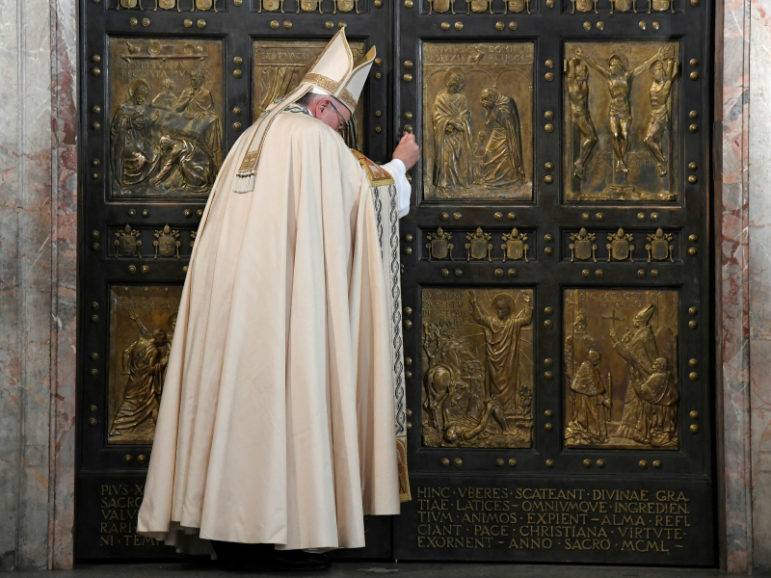
Pope Francis closes the Holy Door in Saint Peter’s Basilica to mark the closing of the Jubilee Year of Mercy. November 20, 2016. Photo via Reuters.
VATICAN CITY (RNS) Pope Francis closed a special Holy Year of Mercy by calling the Catholic Church back to its roots in Jesus’ sacrifice on the cross, telling churchmen and a huge crowd of pilgrims in St. Peter’s Square that using “power and success” to evangelize betrays the Gospel message.
“How many times, even among ourselves, do we seek out the comforts and certainties offered by the world,” Francis told the sun-splashed gathering and an array of more than 200 cardinals and bishops who celebrated Mass with him on Sunday (Nov. 20).
Among them were more than a dozen new cardinals he had elevated a day earlier.
“The lure of power and success seem an easy, quick way to spread the Gospel; we soon forget how the Kingdom of God works,” he said.
Francis said the Holy Year of Mercy was a chance for Catholics to “rediscover the core, to return to what is essential” and to “rediscover the youthful, beautiful face of the church, the face that is radiant when it is welcoming, free, faithful, poor in means but rich in love, on mission.”
READ: What’s that Jubilee Year of Mercy the pope keeps talking about?
The pope’s homily essentially summarized the principal spiritual themes that Francis has stressed since his election in 2013: that the Catholic Church must identify with the poor and marginalized, must witness through service, and must always stress the mercy of God rather than doctrinal proclamations and rigid rules.
The Jubilee Year of Mercy that he proclaimed last year began last December and featured the opening of a Holy Door in St. Peter’s Basilica, as is customary for such occasions. But the pope also asked that dioceses and churches around the world establish their own holy doors for pilgrims to pass through, and even prison doors could be used as holy doors.
In an interview published last week, Francis said the idea for the Holy Year came to him as an inspiration of the Holy Spirit. “I didn’t make any plan,” he said. “Things just came to me. I let myself be led by the Spirit.”
Vatican officials estimated that over 20 million people participated in the jubilee year events at the Vatican, many of them passing through the Holy Door to gain what the church calls a “plenary indulgence,” which is defined as “the remission before God of the temporal punishment due for sins already forgiven.”
The Vatican said up to a billion people may have passed through holy doors around the world.
Well over 100,000 attended Sunday’s Mass.
In his homily, Francis reiterated that the end of the Year of Mercy and the closing of the Holy Door – which he did at the start of the service – of course does not mean that God’s mercy is somehow curtailed. On the contrary.
God “is ready to completely and forever cancel our sin, because his memory – unlike our own – does not record evil that has been done or keep score of injustices experienced,” Francis said.
“God has no memory of sin, but only of us, of each of us, we who are his beloved children. And he believes that it is always possible to start anew, to raise ourselves up.”
On Saturday, the pontiff delivered a more pointed message as he elevated 17 new cardinals in a ceremony inside St. Peter’s Basilica.
READ: Is the pope Catholic? Francis dismisses critics of his teachings
In his address, Francis exhorted the world and his own Catholic Church to reject “the virus of polarization and animosity” and the growing temptation to “demonize” those who are different.
The pontiff’s speech came across as an indictment of the populist and nationalist anger roiling countries around the world, displayed most recently by the stunning election of Donald Trump as president of the U.S.
But it was also seen as a rebuke to critics who have accused Francis of watering down doctrine and undermining the church with his pastoral approach to ministry.
In the latest example, four hard-line cardinals last week went public with their demands that Francis dispel their concerns about his teachings or face serious consequences.
One of the four is U.S. Cardinal Raymond Burke, a Rome-based prelate and longtime opponent of the pontiff’s policies, who told a reporter last week that if Francis did not offer a clarification, the next step would be to make “a formal act of correction of a serious error” — a phrase that some believe is tantamount to accusing the pope of heresy.
Burke was noticeably absent from the events this weekend honoring the new cardinals, among them three of his fellow Americans.




